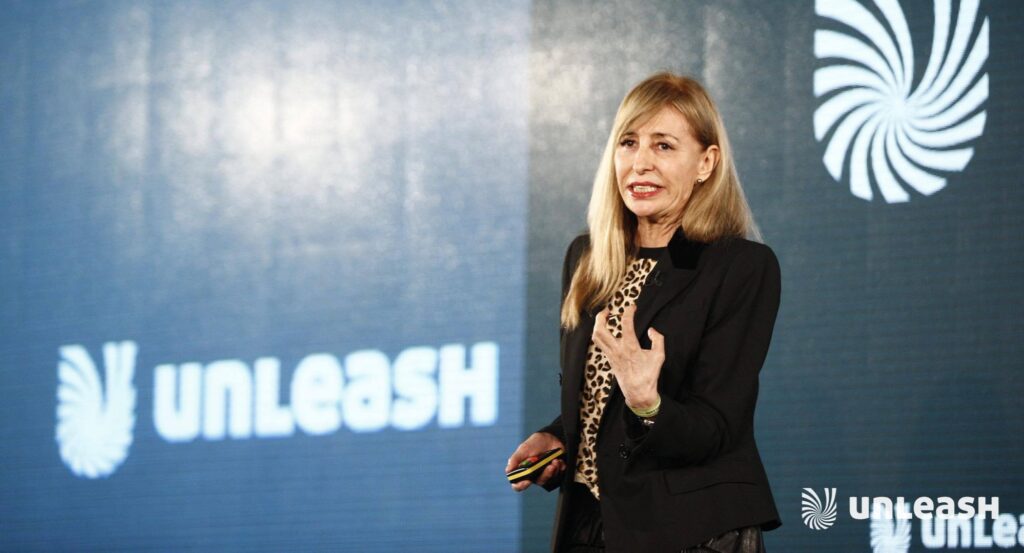Nudging: what HR professionals should understand about behavioural science

Getting people to change their behaviour or make certain choices requires a ‘nudge’ – but how can HR teams make sure that they are not only nudging effectively, but ethically too? You may have noticed that there is a buzz around ‘nudging’, or behavioural economics as it is more formally called. You will doubtless have […]
‘The Brain at Work in the 21st Century’ – Baroness Susan Greenfield at UNLEASH London 2019

What do humans do best? We learn. In a fascinating quick-fire lesson on neuroscience at UNLEASH London this year, Baroness Susan Greenfield couldn’t emphasise this enough. One important lesson we’ve not yet learnt though is that technology is having a damaging impact on our brain’s development. Neuroplasticity is a critical feature of our brain’s development. […]
Minimise threat and maximise reward to accelerate change
Discover why it’s important for businesses to develop a sound understanding of neuroscience principles to help employees through periods of change and uncertainty. Is there a leader today who is not involved in a change situation? Most leaders have some form of change project or programme going on. With the amount of uncertainty and the challenging […]
Is there such a thing as emoji-nal intelligence?
Our ability to express emotions in the workplace could be made simpler by using the humble emoji. By no means are they a substitute for real life interactions, but research suggests they could facilitate a more nuanced interpretation of emails and text messages. Being born in the mid-90s, I am a so-called millennial. I am part of the generation that […]
Behavioural science: joined-up brain dots for the joined-up HR professional

Didn’t get the chance to attend CIPD’s 2018 Behavioural Science at Work Conference and Workshop? We’ve got you covered – here’s a round up of the key themes, topics and takeaways from the event. Behavioural Science is safely established on the business agenda and established too with its annual place on the CIPD events calendar. I […]
Why leaders need to put on their oxygen mask and take care of themselves

If leaders don’t look after their own wellbeing first and foremost, they won’t have the capacity to care for their people and organisation properly. It might seem counter-intuitive, in a world where ‘servant-leadership’ is widely recognised as a concept, to write an article about why leaders need to look after themselves. This article came about […]
Employees who keep their smartphone close by are reducing their brain power

At Academics’ Corner we explore the latest HR research coming out of the academic sector that HR professionals need to know about. Here, Jan Hills, Partner at Head Heart + Brian, outlines a study that shows how the proximity of smartphones can impact performance at work. We all know how annoying it can be when someone keeps looking at their […]
The impact of organisational change on the brain

This is the first in a series of four articles by Hilary Scarlett, speaker, consultant and author on Better Organisational Change through Neuroscience. They draw from her book, Neuroscience for Organizational Change – an evidence-based, practical guide to managing change. The articles explore how the brain responds to organisational change and, equipped with a better understanding […]
Why are some people more resilient when facing change?

In the first of this series of articles on Better Organisational Change Through Neuroscience, we looked at why our brains find organisational change difficult. Change that is unpredictable and uncontrollable is particularly stressful to the brain. But as anyone who has been through organisational change will know, it can be difficult to foresee how people will […]
We have hugely underestimated people’s need for social connection at work

This is the third in a series of four articles on Better Organisational Change through Neuroscience by Hilary Scarlett, speaker, consultant and author of Neuroscience for Organizational Change – an evidence-based practical guide to managing change. We have hugely underestimated people’s need for social connection at work. We understand the importance of relationships in our personal […]
How to stay calm during organisational change

This is the last in a series of four articles on Better Organisational Change through Neuroscience by Hilary Scarlett, speaker, consultant and author of Neuroscience for Organizational Change – an evidence-based practical guide to managing change. Wouldn’t we get through the world of work more easily if we were logical and unemotional? In his book, Descartes’ […]
Employee engagement: sometimes it is the small things that make a difference

Employee engagement – there are lots of great resources out there on how to improve employee engagement across the organisation. But for most of us, it’s not so much the big interventions that make a difference to how we feel about work, it’s the small things – the day-to-day ‘stuff’. Small things can make a […]
Have we got authenticity wrong?

What do successful leaders need more than anything? Well according to the Harvard Business Review in January 2015, “Authenticity has emerged as the gold standard for leadership.” Most leading companies provide programmes or coaching to develop “authentic leaders”. And reams of paper and internet columns have been devoted to describing what authenticity is and how you achieve […]
Brain-savvy Woman: a two-in-one guide to the neuroscience that can help your career

HRZone has a range of books available for review. If you would like to receive one of our business books, free of charge, please contact the editor on editor at hrzone dot com and we can send you a list of what’s available. In return, we ask for a 400-700 word review of the book, […]
Book review: Brain Savvy HR by Jan Hills

HRZone has a range of books available for review. If you would like to receive one of our business books, free of charge, please contact the editor on editor at hrzone dot com and we can send you a list of what’s available. In return, we ask for a 400-700 word review of the book, […]
Book review: Social: Why our brains are wired to connect

HRZone has a range of books available for review. If you would like to receive one of our business books, free of charge, please contact the editor on editor at hrzone dot com and we can send you a list of what’s available. In return, we ask for a 400-700 word review of the book, […]
Can neuroscience enhance acceptance of Emotional Intelligence?

I have always felt that Emotional Intelligence (EI) as a method for developing leaders and guiding behaviour in organisations is much better understood and accepted within HR than it is with leaders themselves. Somehow despite the enormous popularity of Daniel Golemen’s books it has never really caught on to the extent it probably should in […]
Evidence-based agony aunt: I feel like I’ve been harshly judged in my appraisal

Our evidence-based agony aunt, Jan Hills, uses findings from neuroscience and psychology to tell you how to solve your organisational problems in brain-savvy ways, that work with the mind’s natural tendecies and not against it. Got a problem you want her to look at it? Drop us a line at editor@hrzone.com. We’ll get back quickly. […]
Evidence-based agony aunt: I don’t know which job offer to take!

Our evidence-based agony aunt, Jan Hills, uses findings from neuroscience and psychology to tell you how to solve your organisational problems in brain-savvy ways, that work with the mind’s natural tendecies and not against it. Got a problem you want her to look at it? Drop us a line at editor@hrzone.com. We’ll get back quickly. […]
Evidence-based agony aunt: helping a nayser deal with their new tendencies

Our evidence-based agony aunt, Jan Hills, uses findings from neuroscience and psychology to tell you how to solve your organisational problems in brain-savvy ways, that work with the mind’s natural tendecies and not against it. Got a problem you want her to look at it? Drop us a line at editor@hrzone.com. We’ll get back quickly. […]
